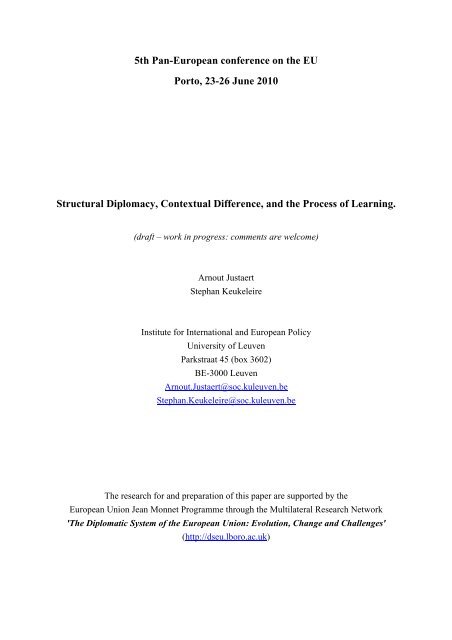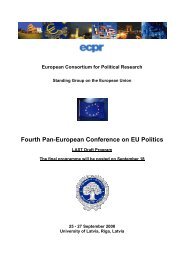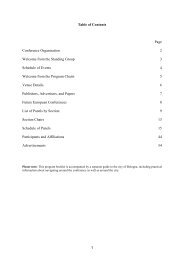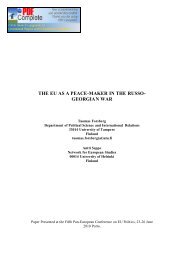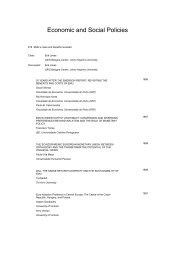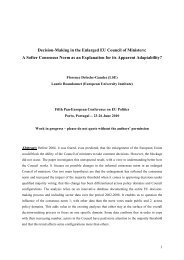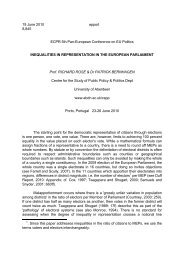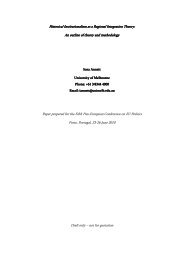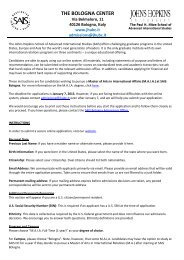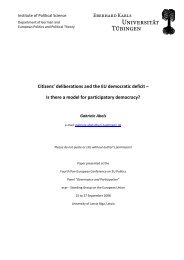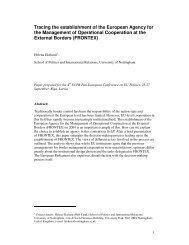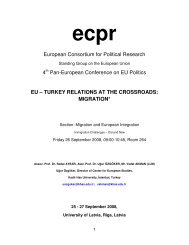Structural Diplomacy, Contextual Difference, and the Process of ...
Structural Diplomacy, Contextual Difference, and the Process of ...
Structural Diplomacy, Contextual Difference, and the Process of ...
Create successful ePaper yourself
Turn your PDF publications into a flip-book with our unique Google optimized e-Paper software.
5th Pan-European conference on <strong>the</strong> EU<br />
Porto, 23-26 June 2010<br />
<strong>Structural</strong> <strong>Diplomacy</strong>, <strong>Contextual</strong> <strong>Difference</strong>, <strong>and</strong> <strong>the</strong> <strong>Process</strong> <strong>of</strong> Learning.<br />
(draft – work in progress: comments are welcome)<br />
Arnout Justaert<br />
Stephan Keukeleire<br />
Institute for International <strong>and</strong> European Policy<br />
University <strong>of</strong> Leuven<br />
Parkstraat 45 (box 3602)<br />
BE-3000 Leuven<br />
Arnout.Justaert@soc.kuleuven.be<br />
Stephan.Keukeleire@soc.kuleuven.be<br />
The research for <strong>and</strong> preparation <strong>of</strong> this paper are supported by <strong>the</strong><br />
European Union Jean Monnet Programme through <strong>the</strong> Multilateral Research Network<br />
'The Diplomatic System <strong>of</strong> <strong>the</strong> European Union: Evolution, Change <strong>and</strong> Challenges'<br />
(http://dseu.lboro.ac.uk)
Introduction<br />
<strong>Structural</strong> diplomacy refers to <strong>the</strong> process <strong>of</strong> dialogue <strong>and</strong> negotiation by which actors in <strong>the</strong><br />
international system seek to influence or shape sustainable external political, legal, economic,<br />
social <strong>and</strong> security structures in a given geographic space. The need to restructure became<br />
particularly pertinent for those regions <strong>and</strong> countries where long-st<strong>and</strong>ing structures<br />
disappeared, such as <strong>the</strong> countries that until <strong>the</strong> late 1980s were organized on <strong>the</strong> basis <strong>of</strong> <strong>the</strong><br />
communist ideology, or <strong>the</strong> countries <strong>and</strong> regions for instance in <strong>the</strong> Mediterranean or Africa<br />
that were ‘disciplined’ through <strong>the</strong>ir belonging to ei<strong>the</strong>r <strong>the</strong> ‘Western’ or ‘Eastern’ camp<br />
during <strong>the</strong> East-West conflict. Within this changing context, <strong>the</strong> capacity to ‘structure’ o<strong>the</strong>r<br />
countries, regions <strong>and</strong> <strong>the</strong> global environment <strong>and</strong> to influence long-term structural changes<br />
became <strong>and</strong> remains a core element in <strong>the</strong> international diplomacy (Keukeleire <strong>and</strong><br />
MacNaughtan 2008: 14-15).<br />
However, contexts <strong>and</strong> endogenous factors <strong>and</strong> realities constitute major differences<br />
between societies, countries or regions. Yet, this is not a recurrent <strong>the</strong>me in <strong>the</strong> analyses nor in<br />
<strong>the</strong> literature on international diplomacy, <strong>and</strong> even more in general in <strong>the</strong> international<br />
relations <strong>and</strong> foreign policy literature. Or, to put it even stronger, “<strong>the</strong>ory <strong>and</strong> practice aimed<br />
to contain, domesticate, or destroy difference – to establish an ‘empire <strong>of</strong> uniformity’”<br />
(Inayatullah <strong>and</strong> Blaney, 2004: 3). International relations <strong>and</strong> diplomacy studies are indeed<br />
dominated by Westphalian paradigms as constitutive for contemporary international relations.<br />
This tendency has been facilitated by <strong>the</strong> lack <strong>of</strong> development <strong>of</strong> an international relations<br />
perspective that concentrates on ‘difference’ <strong>and</strong> confronts mainstream IR concepts with<br />
socio-cultural <strong>and</strong> contingent diversity.<br />
We argue that <strong>the</strong> structural diplomacy framework takes <strong>the</strong>se endogenous factors <strong>and</strong><br />
realities based on contextual <strong>and</strong> conceptual differences into account. In this paper <strong>the</strong> authors<br />
elaborate first upon structural diplomacy <strong>and</strong> analyse <strong>the</strong> main building blocks <strong>of</strong> this<br />
framework. In <strong>the</strong> second place, we analyse <strong>the</strong> diplomatic systems <strong>of</strong> <strong>the</strong> European Union<br />
<strong>and</strong> its target countries <strong>and</strong> classify <strong>the</strong>m as two separate diplomatic subsystems that are both<br />
guided by specific belief systems. Third we argue that structural diplomacy is a two-way<br />
process in which interaction <strong>and</strong> negotiation between <strong>the</strong> two diplomatic subsystems can lead<br />
to learning <strong>and</strong> a mutual underst<strong>and</strong>ing <strong>of</strong> each o<strong>the</strong>rs’ contexts <strong>and</strong> belief systems. Finally<br />
<strong>the</strong> paper ends with drafting a research agenda to investigate <strong>the</strong> EU’s structural diplomacy<br />
towards <strong>the</strong>se two main regions in world politics <strong>and</strong> in EU diplomacy, <strong>the</strong> Balkans <strong>and</strong> <strong>the</strong><br />
African Great Lakes region.<br />
2
1. <strong>Structural</strong> <strong>Diplomacy</strong> 1<br />
<strong>Structural</strong> diplomacy refers to <strong>the</strong> process <strong>of</strong> dialogue <strong>and</strong> negotiation by which actors in a<br />
system seek to influence or shape sustainable structures in <strong>the</strong> various relevant sectors<br />
(political, legal, social, economic, security <strong>and</strong> o<strong>the</strong>r) <strong>and</strong> on <strong>the</strong> various relevant levels<br />
(individual, societal, state, regional, global). It is an instrument <strong>of</strong> a wider structural foreign<br />
policy, which is directed towards <strong>the</strong> same goals, but refers to <strong>the</strong> policy at large, including<br />
<strong>the</strong> use <strong>of</strong> a wide array <strong>of</strong> o<strong>the</strong>r instruments (such as economic, financial <strong>and</strong> technical<br />
support measures, institution building, rule <strong>of</strong> law missions, etc.).<br />
Figure 1:<br />
SECTORS<br />
STRUCTURES Political Legal Socio-economic Security [o<strong>the</strong>r]<br />
L<br />
E<br />
V<br />
E<br />
L<br />
S<br />
Individual<br />
Individual-state<br />
Individualsociety<br />
Society<br />
State<br />
Society-state<br />
Regional<br />
Inter-state<br />
Inter-societal<br />
Inter-regional<br />
Global<br />
<strong>Structural</strong><br />
In <strong>the</strong> above-mentioned definition <strong>of</strong> structural diplomacy, <strong>the</strong> qualification structural refers<br />
to three key aspects: <strong>the</strong> objective to influence or shape structures, <strong>the</strong> objective to have<br />
effects that are structural or sustainable, <strong>and</strong> <strong>the</strong> enduring character <strong>of</strong> <strong>the</strong> objectives <strong>and</strong><br />
diplomatic efforts.<br />
First, ‘structural’ refers to <strong>the</strong> objective to influence or shape structures. These structures<br />
consist <strong>of</strong> organizing principles, rules <strong>of</strong> <strong>the</strong> game <strong>and</strong> institutions that shape <strong>and</strong> order <strong>the</strong><br />
political, legal, economic, social <strong>and</strong> security fields in a given geographical space. Structures<br />
entail both general organizing principles <strong>and</strong> rules <strong>of</strong> <strong>the</strong> game (such as ‘capitalism’,<br />
‘democracy’, ‘rule <strong>of</strong> law’ or ‘peaceful resolution <strong>of</strong> conflicts’) <strong>and</strong> <strong>the</strong> operationalization <strong>of</strong><br />
1 This section is to a large extent based on Keukeleire, Thiers <strong>and</strong> Justaert, 2009: 146-152.<br />
3
<strong>the</strong>se principles through a complex constellation <strong>of</strong> institutions, laws, habits, etc. 2 The<br />
purpose <strong>of</strong> structural diplomacy is to change or streng<strong>the</strong>n <strong>the</strong>se specific constellations <strong>of</strong><br />
rules <strong>of</strong> <strong>the</strong> game, institutions, laws <strong>and</strong> habits in a country or, more far-reaching <strong>and</strong><br />
ambitious, to promote <strong>the</strong> adoption <strong>of</strong> new organizing principles (for example: ‘democracy’ in<br />
case <strong>of</strong> a non-democratic country) <strong>and</strong> <strong>the</strong> subsequent operationalization <strong>of</strong> <strong>the</strong>se principles.<br />
When systemic changes occur (as was <strong>the</strong> case with <strong>the</strong> fall <strong>of</strong> <strong>the</strong> communism in 1989-1991)<br />
or a vacuum exists (for instance after a war, such as after World War II, <strong>the</strong> Balkan wars or<br />
<strong>the</strong> war in Iraq), <strong>the</strong> objective <strong>of</strong> a structural diplomacy can be to shape new structures. When<br />
a more or less established set <strong>of</strong> structures already exists in a specific geographic setting, <strong>the</strong><br />
objective <strong>of</strong> a structural diplomacy will be to influence <strong>the</strong>se structures. In our analysis, we<br />
mainly present structural diplomacy as aiming at structural changes. However, structural<br />
diplomacy can also aim at assuring structural stability, status quo <strong>and</strong> continuity. The<br />
objective is <strong>the</strong>n to support <strong>and</strong> maintain existing structures <strong>and</strong> to avoid structural changes<br />
from occurring.<br />
Second, <strong>the</strong> qualification ‘structural’ refers to <strong>the</strong> objective to have effects that are<br />
sustainable. The structures that are pursued should not only be viable in <strong>the</strong> short term, but<br />
should equally be sustainable in <strong>the</strong> long term, including when <strong>the</strong> intensity <strong>of</strong> <strong>the</strong> structural<br />
diplomacy diminishes or when <strong>the</strong> activities in <strong>the</strong> context <strong>of</strong> structural diplomacy are<br />
concluded. The purpose <strong>of</strong> <strong>the</strong> process <strong>of</strong> dialogue <strong>and</strong> negotiation is thus not simply to shape<br />
or influence structures, but to shape or influence structures in such a way that <strong>the</strong>se structures<br />
obtain an enduring character <strong>and</strong> become relatively permanent. Only <strong>the</strong>n it becomes possible<br />
to speak <strong>of</strong> structural changes or structural reforms caused by structural diplomacy<br />
(alongside o<strong>the</strong>r factors – see below). Both material <strong>and</strong> immaterial or ideational factors can<br />
contribute to <strong>the</strong> sustainability <strong>of</strong> structures <strong>and</strong> thus to <strong>the</strong> long-term success <strong>of</strong> a structural<br />
diplomacy. The material factors are related to <strong>the</strong> practical operationalization <strong>and</strong> functioning<br />
<strong>of</strong> <strong>the</strong> structures that are promoted <strong>and</strong> to <strong>the</strong> context in which <strong>the</strong>y are embedded. The<br />
immaterial factors are related to issues such as <strong>the</strong> interiorization <strong>of</strong> principles, legitimacy <strong>and</strong><br />
to what we label as ‘mental structures’ or ‘mindsets’. These various factors are discussed in<br />
<strong>the</strong> following section, as <strong>the</strong>y affect <strong>the</strong> chance <strong>of</strong> success <strong>of</strong> a structural diplomacy.<br />
The objective <strong>of</strong> influencing structures in a sustainably way requires enduring <strong>and</strong><br />
intensive efforts, with <strong>the</strong> attention for structures becoming a constitutive part <strong>of</strong> <strong>the</strong><br />
diplomatic efforts. Continuity <strong>and</strong> consistency in <strong>the</strong> activities <strong>of</strong> all diplomatic actors<br />
2 This also points to <strong>the</strong> difference between structural diplomacy <strong>and</strong> development cooperation or development<br />
policy. The latter are in <strong>the</strong> first place focused on poverty reduction <strong>and</strong> o<strong>the</strong>r UN Millennium Development<br />
Goals. Traditionally, <strong>the</strong> development cooperation approach <strong>of</strong> <strong>the</strong> EU <strong>and</strong> European countries was to pursue<br />
<strong>the</strong>se goals within (<strong>and</strong> thus without questioning) <strong>the</strong> existing political, economic <strong>and</strong> security structures <strong>of</strong> <strong>the</strong><br />
third country. However, this development policy/cooperation increasingly obtain a structural dimension, with<br />
Western actors in <strong>the</strong> contacts with Sou<strong>the</strong>rn countries increasingly pointing to <strong>the</strong> need to pursue structural<br />
changes as a complement to or condition for development aid. To <strong>the</strong> extent that this is <strong>the</strong> case, development<br />
policy remains distinct but can never<strong>the</strong>less be part <strong>of</strong> a structural diplomacy (Keukeleire <strong>and</strong> MacNaughtan,<br />
2008: pp. 215-216).<br />
4
engaged are <strong>the</strong>refore <strong>the</strong> third element <strong>of</strong> structural diplomacy. Intensity points to <strong>the</strong> active<br />
approach which is required in a structural diplomacy <strong>and</strong> which implies more than <strong>the</strong> <strong>of</strong>ten<br />
merely ritual repetition <strong>of</strong> general values <strong>and</strong> principles. One might indeed observe that <strong>the</strong><br />
promotion <strong>of</strong> rule <strong>of</strong> law, human rights etc. are <strong>the</strong> subject <strong>of</strong> many diplomatic actions <strong>of</strong> <strong>the</strong><br />
West <strong>and</strong> <strong>the</strong> EU in particular. However, very <strong>of</strong>ten, <strong>the</strong>se are subject <strong>of</strong> a merely declaratory<br />
diplomacy, which is not supported by an active process <strong>of</strong> dialogue <strong>and</strong> negotiation aimed,<br />
first, at convincing o<strong>the</strong>r actors about <strong>the</strong> need, desirability <strong>and</strong> feasibility <strong>of</strong> creating or<br />
changing <strong>the</strong> various relevant structures <strong>and</strong>, second, at supporting, advising <strong>and</strong> steering<br />
<strong>the</strong>m in <strong>the</strong> translation <strong>of</strong> general organizing principles into concrete institutions <strong>and</strong> rules.<br />
The intensity also implies that <strong>the</strong> frequency <strong>and</strong> pr<strong>of</strong>undity <strong>of</strong> contacts between <strong>the</strong> actors<br />
that are involved in <strong>the</strong> structural diplomacy need to be high. It also implies that a dialogue<br />
with a wide range <strong>of</strong> actors in <strong>the</strong> third country is needed, as <strong>the</strong> goal is not only to convince<br />
<strong>the</strong> diplomatic <strong>and</strong> political counterparts about <strong>the</strong> general principles <strong>of</strong> <strong>the</strong> proposed<br />
structural changes, but also to interact with those responsible for translating <strong>the</strong>se principles<br />
into concrete operational terms. The required long-term approach refers to <strong>the</strong> time<br />
dimension. A structural diplomacy is dependent on sustained diplomatic efforts: changing<br />
structures is a long-term process <strong>and</strong> <strong>the</strong>refore dem<strong>and</strong>s a continued dialogue <strong>and</strong> follow-up.<br />
This also explains why this process <strong>of</strong> dialogue <strong>and</strong> negotiation can become institutionalized,<br />
ei<strong>the</strong>r formally or informally. In this context, it is useful to emphasise that influencing or<br />
shaping structures within which actors operate can thus be harder <strong>and</strong> take more time than just<br />
influencing or changing <strong>the</strong> behaviour <strong>of</strong> actors. However, if successful, <strong>the</strong> impact <strong>of</strong> such a<br />
structural diplomacy can be both more pr<strong>of</strong>ound <strong>and</strong> more enduring.<br />
Sustainability<br />
In order for a structural diplomacy to be sustainable, i.e. viable in <strong>the</strong> longer term, two<br />
determinants seem to be crucial: (1) <strong>the</strong> comprehensiveness <strong>of</strong> <strong>the</strong> external diplomatic<br />
activities <strong>and</strong> (2) <strong>the</strong>ir embeddedness in endogenous realities <strong>and</strong> alignment to local<br />
structures.<br />
The comprehensiveness <strong>and</strong> interrelatedness results from <strong>the</strong> close relationship between<br />
<strong>and</strong> interdependence <strong>of</strong> <strong>the</strong> various relevant structures (political, legal, social, economic <strong>and</strong><br />
security structures) <strong>and</strong> levels (individual, societal, state, regional <strong>and</strong> global). Consequently,<br />
to be effective, structural diplomacy generally needs to focus simultaneously on various<br />
relevant structures <strong>and</strong> levels, <strong>and</strong> at least has to take into account <strong>the</strong> impact <strong>of</strong> structural<br />
changes on o<strong>the</strong>r levels or structures. Neglecting one or more relevant levels or sectors can<br />
undermine <strong>the</strong> achievements at o<strong>the</strong>r levels <strong>and</strong> structures. Here we can refer once again to<br />
democracy promotion efforts. As Linz <strong>and</strong> Stepan (1996) have argued, a structural change<br />
towards democracy cannot be successful when only focusing on <strong>the</strong> tenure <strong>of</strong> free <strong>and</strong> fair<br />
elections. In <strong>the</strong> absence <strong>of</strong> functioning rule <strong>of</strong> law structures or a civil society that is willing<br />
5
to participate in political democratic life, all diplomatic democratizing actions may fail in <strong>the</strong><br />
long term. Ano<strong>the</strong>r example are diplomatic actions aimed at promoting specific changes in <strong>the</strong><br />
macro-economic structures <strong>of</strong> a specific country. If one neglects to take into account <strong>the</strong><br />
existing micro-economic structures <strong>and</strong> <strong>the</strong> societal level (e.g. <strong>the</strong> patriarchal <strong>and</strong>/or selfsustaining<br />
agricultural nature <strong>of</strong> a society), diplomatic efforts are very likely to fail in <strong>the</strong> long<br />
term.<br />
Next, <strong>the</strong> factor <strong>of</strong> comprehensiveness points to <strong>the</strong> need for a structural diplomacy to be<br />
embedded within a broader range <strong>of</strong> structural <strong>and</strong> traditional foreign policy initiatives. A<br />
structural diplomacy needs to be backed up by a broader structural foreign policy, which<br />
employs all instruments available <strong>and</strong> considered as necessary in order to pursue <strong>the</strong> objective<br />
<strong>of</strong> structural changes (or <strong>of</strong> supporting existing structures) outside <strong>the</strong> own borders<br />
(Keukeleire <strong>and</strong> MacNaughtan, 2008: 25-28, 335-338). In order to be effective, <strong>the</strong> process <strong>of</strong><br />
dialogue <strong>and</strong> negotiation needs to be complemented <strong>and</strong> supported by a process <strong>of</strong> technical,<br />
material, financial, economic <strong>and</strong> o<strong>the</strong>r assistance to <strong>the</strong> third country, in order to allow <strong>the</strong>m<br />
to practically transform (or maintain) <strong>the</strong>ir structures. This assistance can vary from merely<br />
sending experts to assist in developing a judicial system, to carrying out comprehensive <strong>and</strong><br />
long-term assistance programmes. As structural foreign policy aims to influence political,<br />
legal, social, economic <strong>and</strong> security structures on various levels, a wide <strong>and</strong> diverse range <strong>of</strong><br />
instruments are needed in function <strong>of</strong> <strong>the</strong> specific nature <strong>and</strong> requirements <strong>of</strong> each <strong>of</strong> <strong>the</strong>se<br />
structures <strong>and</strong> levels. Besides providing assistance, structural diplomacy can also be<br />
supported, complemented or preceded by o<strong>the</strong>r types <strong>of</strong> foreign policy measures, including<br />
carrots (such as promising <strong>and</strong> providing major rewards or compensations) <strong>and</strong> sticks<br />
(threatening with or adopting coercive measures in case structural changes are blocked).<br />
However, as will be explained later on, whereas <strong>the</strong>se carrots <strong>and</strong> sticks can be quite<br />
instrumental in effectively influencing or shaping structures (<strong>the</strong> first key aspect <strong>of</strong><br />
‘structural’), <strong>the</strong>y can be detrimental in terms <strong>of</strong> sustainability <strong>of</strong> <strong>the</strong>se structures (<strong>the</strong> second<br />
key aspect <strong>of</strong> ‘structural’).<br />
The second building block for <strong>the</strong> sustainability <strong>of</strong> a structural diplomacy is <strong>the</strong><br />
consideration <strong>of</strong> <strong>the</strong> endogenous, local context <strong>of</strong> <strong>the</strong> target country, region or society in <strong>the</strong><br />
formulation <strong>of</strong> approaches <strong>and</strong> <strong>the</strong> diplomatic negotiation. In mainstream IR or foreign policy<br />
literature endogenous factors refer to processes or factors internal to <strong>the</strong> actors conducting<br />
diplomacy, both at <strong>the</strong> level <strong>of</strong> <strong>the</strong> individual states <strong>and</strong> at <strong>the</strong> level <strong>of</strong> states operating in<br />
international organisations or multilateral fora (Smith, K.E., 1999: 177). In <strong>the</strong> context <strong>of</strong> a<br />
structural diplomacy, however, it refers to <strong>the</strong> contingent <strong>and</strong> contextual factors that<br />
characterize <strong>the</strong> target. Diplomatic actors do not only act differently towards separate targets<br />
based on <strong>the</strong> interests or nature <strong>of</strong> <strong>the</strong> relationships at stake, but <strong>the</strong>se targets also require<br />
various approaches based on <strong>the</strong>ir specific – endogenous – characteristics <strong>and</strong> structures. The<br />
historical, sociological, political <strong>and</strong> o<strong>the</strong>r characteristics <strong>and</strong> structures constitute <strong>and</strong> <strong>the</strong><br />
6
environment in which <strong>the</strong> local actors are embedded <strong>and</strong> thus determine <strong>the</strong> specific nature<br />
<strong>and</strong> structure <strong>of</strong> <strong>the</strong>ir diplomacy.<br />
In <strong>the</strong> elaboration <strong>of</strong> an international structural diplomacy, sustainability depends on <strong>the</strong><br />
alignment (High Level Forum, 2005: 3-6) to <strong>the</strong> existing institutions, structures <strong>and</strong> to <strong>the</strong>se<br />
endogenous factors, which in turn has an influence on <strong>the</strong> ownership <strong>and</strong> <strong>the</strong> legitimacy <strong>of</strong> <strong>the</strong><br />
structural diplomacy (See Keukeleire, Thiers <strong>and</strong> Justaert, 2009: 151-152). The existence <strong>of</strong><br />
contextual <strong>and</strong> conceptual differences between target countries also implies that <strong>the</strong><br />
application <strong>of</strong> general blueprints or approaches in <strong>the</strong> elaboration <strong>of</strong> diplomacy is not that<br />
evident. The degree to which endogenous actors, factors, processes, values, traditions,<br />
sensitivities <strong>and</strong> mindsets in <strong>the</strong> target country, society or region at stake are taken into<br />
account is <strong>the</strong>refore a crucial variable in structural diplomacy. It is also in this context that <strong>the</strong><br />
recognition <strong>of</strong> ‘difference’ becomes essential, toge<strong>the</strong>r with a learning process aimed at<br />
recognizing potential difference.<br />
2. Diplomatic Communities as Policy Subsystems<br />
The EU’s Diplomatic System<br />
Diplomatic communities can be perceived as subsystems in which specific values, principles<br />
<strong>and</strong> codes are shared as well as certain policy belief systems that structure <strong>the</strong>ir behaviour,<br />
interactions among <strong>the</strong>m <strong>and</strong> with target actors, policy convictions, etc. As argued by<br />
Inayatullah <strong>and</strong> Blaney (2004) ‘Western’ systems, such as diplomacy, are guided by<br />
Westphalian <strong>and</strong> modernisation paradigms. International as well as European diplomatic<br />
systems are indeed based upon <strong>and</strong> directed towards a nation-state division as primary<br />
organising principle in world politics perceiving diplomacy essentially as an institution for <strong>the</strong><br />
conduct <strong>of</strong> inter-state relations (Jönsson, 2002: 212). The perspective on ‘diplomacy’ <strong>and</strong><br />
‘diplomatic actors’ broadened gradually with <strong>the</strong> introduction <strong>of</strong> new actors in diplomatic<br />
processes, such as international organisations, non-governmental organisations, enterprises<br />
<strong>and</strong> private consultancy, <strong>and</strong> thus <strong>the</strong> emergence <strong>of</strong> new labels such as private diplomacy <strong>and</strong><br />
paradiplomacy (Melissen, 1999; Meerts, 1999). More recently diplomatic systems also<br />
exp<strong>and</strong> towards sub state diplomacy between regions (Criekemans, 2010).<br />
The EU’s diplomatic system is thus in fact a multi-level diplomatic level which fur<strong>the</strong>r<br />
elaborates on <strong>the</strong> Westphalian system: <strong>the</strong> national diplomatic level, <strong>the</strong> EU diplomatic level<br />
(in which national diplomacies do still play a major role, despite <strong>the</strong> post-Lisbon reforms) <strong>and</strong><br />
<strong>the</strong> international multilateral level (in which <strong>the</strong> national diplomatic actors do still play a<br />
central role, despite <strong>the</strong> growing role <strong>the</strong> EU’s diplomatic actors). The gradual streng<strong>the</strong>ning<br />
<strong>of</strong> <strong>the</strong> EU level leads to <strong>the</strong> observation that <strong>the</strong> nature <strong>of</strong> diplomacy is gradually changing too<br />
7
<strong>and</strong> is going beyond <strong>the</strong> traditional Westphalian model (Hocking <strong>and</strong> Spence, 2005; Batora<br />
2005; Hocking, B. <strong>and</strong> J. Batora 2009). However, what is <strong>of</strong>ten neglected is that this emerging<br />
diplomatic system <strong>of</strong> <strong>the</strong> EU does still fit within a political, economic <strong>and</strong> societal context<br />
which is based on <strong>the</strong> Westphalian paradigm <strong>and</strong> modernisation paradigm that are also shared<br />
by <strong>the</strong> member states. The state remains <strong>the</strong> core unit or at least <strong>the</strong> central point <strong>of</strong> reference<br />
with regard to both authority <strong>and</strong> legitimacy (with regions being embedded within this state<br />
system in federalized countries), while <strong>the</strong> economy, <strong>the</strong> institutional <strong>and</strong> legal system <strong>and</strong> <strong>the</strong><br />
society at large are characterized by a far-reaching process <strong>of</strong> modernisation <strong>and</strong> economic<br />
development.<br />
In short: <strong>the</strong> diplomatic communities in <strong>the</strong> target countries or regions can be characterized<br />
by a subsystem that does incorporate <strong>the</strong> ‘Western’ diplomatic systems, values, principles <strong>and</strong><br />
codes, but that does not necessarily mirror an equally ‘Western’ internal reality. This also<br />
means that diplomatic actions by <strong>the</strong> EU vis-à-vis <strong>the</strong>se countries or regions can resonate in a<br />
different way than expected in that country or region - or can resonate not at all. It is against<br />
this background that ‘dialogue’ <strong>and</strong> ‘learning’ emerge as crucial dimensions <strong>of</strong> a structural<br />
diplomacy, as an effective structural diplomacy is only possible when <strong>the</strong> existence <strong>of</strong><br />
different endogenous local contexts is known, recognized <strong>and</strong> taken into account. These<br />
dimensions <strong>of</strong> dialogue <strong>and</strong> learning are discussed in more detail in <strong>the</strong> following sections.<br />
The Target Country’s Diplomatic System<br />
The latter is not true, or not to <strong>the</strong> same extent true, for <strong>the</strong> diplomatic system <strong>of</strong> a major part<br />
<strong>of</strong> <strong>the</strong> world, as many countries in <strong>the</strong> South are characterized by a dual system. Formally, all<br />
countries in <strong>the</strong> world are part <strong>of</strong> <strong>the</strong> international system, which consists <strong>of</strong> sovereign states<br />
that are also formally recognized by <strong>the</strong> o<strong>the</strong>r states, that as an ultimate recognition <strong>of</strong> <strong>the</strong>ir<br />
existence are also member <strong>of</strong> <strong>the</strong> UN, <strong>and</strong> that are represented by <strong>the</strong>ir government<br />
(independent <strong>of</strong> <strong>the</strong> democratic character <strong>of</strong> <strong>the</strong> political system). And in view <strong>of</strong> <strong>the</strong>ir<br />
inscription in <strong>the</strong> Westphalian state-based system, <strong>the</strong>y also adopted <strong>the</strong> institutional forms,<br />
principles <strong>and</strong> codes linked to diplomacy as <strong>the</strong> central institution for <strong>the</strong> conduct <strong>of</strong> interstate<br />
relations – reflecting <strong>the</strong> transferral <strong>of</strong> Western codes to <strong>the</strong> rest <strong>of</strong> <strong>the</strong> world.<br />
However, what is generally neglected in both <strong>the</strong> conduct <strong>and</strong> study <strong>of</strong> diplomacy <strong>and</strong> <strong>of</strong><br />
international relations in general is that this formal ‘Western’ system is <strong>of</strong>ten paralleled by<br />
traditional or non-Western political forms <strong>and</strong> by pre-modern systems or non-Western forms<br />
<strong>of</strong> modernization (Inayatullah <strong>and</strong> Blaney 2004: 96-97; Delanty <strong>and</strong> Rumford, 2005: 41-42),<br />
<strong>the</strong> effects <strong>of</strong> which are <strong>of</strong>ten fur<strong>the</strong>r reinforces (<strong>and</strong> <strong>of</strong>ten also caused) by substantially lower<br />
levels <strong>of</strong> economic development. This implies, for instance, that o<strong>the</strong>r systems <strong>of</strong> authority<br />
<strong>and</strong> legitimacy can exist, such as kingdoms, chiefdoms, tribes, clans, extended families or<br />
8
o<strong>the</strong>r forms based on kinship, <strong>and</strong> also religion or ethnicity. These systems or smaller but<br />
structural / structuring entities, such as <strong>the</strong> Kurds, <strong>the</strong> ‘Fon’ (kingdoms) in Cameroon, or <strong>the</strong><br />
Pashtun tribes in what is now Pakistan or Afghanistan (with <strong>the</strong>se tribes being fur<strong>the</strong>r<br />
subdivided in an extensive set <strong>of</strong> smaller sub-tribes <strong>and</strong> extended families).can be found<br />
throughout <strong>the</strong> entire world, but play significantly different roles in different places,<br />
especially in pre-modernised societies. By including <strong>the</strong> societal level in our<br />
conceptualization, we also try to avoid at least to some extent what <strong>the</strong> ‘territorial trap’, being<br />
<strong>the</strong> geographical assumptions <strong>of</strong> international relations <strong>the</strong>ory (Agnew 1994; Fitzpatrick,<br />
1998). The societal level can, but indeed does not necessarily correspond to a geographical<br />
entity, which in its turn can but does not necessarily correspond with <strong>the</strong> territorial borders <strong>of</strong><br />
one or more states. Or as Delanty <strong>and</strong> Rumford point out (<strong>the</strong>reby referring to Urry 2000): <strong>the</strong><br />
social ‘is not a territorially bounded entity, but shaped through dynamics <strong>and</strong> processes that<br />
can take variable forms’.<br />
This also implies that what in <strong>the</strong> West are label as ‘pre-modern’ rationalities can play a<br />
predominant role in <strong>the</strong> societies <strong>and</strong> political systems <strong>of</strong> third countries, just as also so-called<br />
universal principles <strong>and</strong> concepts can be given a different interpretation.<br />
3. Conceptual Learning in <strong>and</strong> between Diplomatic Subsystems<br />
<strong>Diplomacy</strong> as a Two-Way <strong>Process</strong><br />
In his now classical definition <strong>of</strong> ‘diplomacy’, Adam Watson (1982: 10) already indicated<br />
that diplomacy is a ‘process <strong>of</strong> dialogue <strong>and</strong> negotiation’. Within <strong>the</strong> context <strong>of</strong> a structural<br />
diplomacy this dimension <strong>of</strong> ‘dialogue’ is particularly important. <strong>Structural</strong> diplomacy cannot<br />
just consist <strong>of</strong> negotiations, <strong>of</strong> putting pressure on o<strong>the</strong>r actors, <strong>and</strong> <strong>of</strong> actually convincing <strong>the</strong><br />
o<strong>the</strong>r. The ‘stronger’ part <strong>of</strong> diplomacy needs to be accompanied by a dimension <strong>of</strong> dialogue.<br />
This dialogue has to precede <strong>and</strong> support negotiations, as this is crucial for underst<strong>and</strong>ing <strong>the</strong><br />
contextual <strong>and</strong> conceptual differences between both diplomatic communities, <strong>the</strong> endogenous<br />
processes <strong>and</strong> preferences <strong>of</strong> <strong>the</strong> target country, society or region <strong>and</strong> to underst<strong>and</strong> how <strong>the</strong><br />
structures promoted through a structural diplomacy can take <strong>the</strong>se into account. Moreover, it<br />
implies as well that, in order to be effective, this dialogue has to be a two-way <strong>and</strong> not just a<br />
one-way process. Although a structural diplomacy implies a certain degree <strong>of</strong> inequality as it<br />
is about influencing structures towards one side’s preferences, <strong>the</strong>se aspects point to an<br />
important level <strong>of</strong> mutual dependency. The structural diplomacy concept <strong>the</strong>refore<br />
emphasizes <strong>the</strong> importance <strong>of</strong> ‘communicative action in world politics’ (Risse, 2000: 1-40).<br />
Alignment implies dialogue <strong>and</strong> negotiation with all <strong>the</strong> actors involved in <strong>the</strong> target country,<br />
also <strong>and</strong> especially with those responsible for translating diplomatic efforts <strong>and</strong> initiatives into<br />
concrete operational terms <strong>and</strong> action. Consequently, not only is <strong>the</strong>re a need for intense<br />
9
contacts at a high political <strong>and</strong> diplomatic level, but also at o<strong>the</strong>r levels - such as lower<br />
governmental <strong>of</strong>ficials, technical experts, parliamentary contacts, non-state actors, etc. -<br />
frequent contacts <strong>and</strong> dialogue form an indispensable aspect <strong>of</strong> a well developed structural<br />
diplomacy. A structural diplomacy stresses <strong>the</strong> continuity, frequency <strong>and</strong> pr<strong>of</strong>undity <strong>of</strong><br />
contacts <strong>and</strong> interactions.<br />
Learning <strong>Contextual</strong> <strong>and</strong> Conceptual <strong>Difference</strong>s<br />
A crucial dimension <strong>of</strong> structural diplomacy is that this dialogue does not only consist <strong>of</strong> twoway<br />
communicative interaction, but is also preceded, nourished <strong>and</strong> characterised by a<br />
process <strong>of</strong> learning (see Grin <strong>and</strong> van de Graaf, 1996; Sch<strong>of</strong>ield <strong>and</strong> Sausman, 2004; Grin <strong>and</strong><br />
Loeber, 2006). Grin <strong>and</strong> van de Graaf argue that “different actors <strong>and</strong> different contexts may<br />
yield different meanings” (1996: 298), but also that “congruency in meanings will only arise<br />
<strong>and</strong> last when some form <strong>of</strong> learning occurs between policy actors <strong>and</strong> target groups” (1996:<br />
308). The various contexts thus lead to different underst<strong>and</strong>ings or meanings <strong>of</strong> specific<br />
concepts creating a cleavage between <strong>the</strong> diplomatic actors <strong>and</strong> <strong>the</strong> local actors <strong>and</strong> <strong>the</strong>ir<br />
rationalities. ‘Western’ diplomatic discourse <strong>and</strong> activities does <strong>of</strong>ten disregard or even<br />
neglect <strong>the</strong>se contextual <strong>and</strong> conceptual differences.<br />
Analytically, three dimensions or stages can be discerned in this process <strong>of</strong> learning: learning<br />
that learning is essential; learning <strong>the</strong> different contexts, concepts <strong>and</strong> structures <strong>of</strong> <strong>the</strong> o<strong>the</strong>r;<br />
<strong>and</strong> learning through <strong>the</strong> actual dialogue;<br />
First, as an essential prerequisite <strong>and</strong> on <strong>the</strong> most fundamental level, this process <strong>of</strong> learning<br />
requires that <strong>the</strong> diplomatic actor recognises <strong>the</strong> importance <strong>of</strong> learning <strong>and</strong>, related to this,<br />
recognizes <strong>the</strong> existence <strong>of</strong> ‘difference’. What is needed is a readiness to learn, based on <strong>the</strong><br />
consciousness that this learning is essential in view <strong>of</strong> <strong>the</strong> remaining character <strong>of</strong> difference<br />
(Inayatullah <strong>and</strong> Blaney 2004: 95). This recognition <strong>of</strong> ‘difference’ also implies a recognition<br />
that o<strong>the</strong>r countries or societies can have “alternative developmental schemas” <strong>and</strong> be subject<br />
<strong>of</strong> different transformative mechanisms <strong>and</strong> processes (Delanty <strong>and</strong> Rumford 2005: 15). For<br />
Western diplomats (but perhaps also for <strong>the</strong> elites <strong>and</strong> diplomats in o<strong>the</strong>r parts <strong>of</strong> <strong>the</strong> world),<br />
this learning process also amounts to <strong>the</strong> challenge formulated by critics <strong>of</strong> <strong>the</strong> modernization<br />
<strong>the</strong>ory which is implicit in most Western thinking <strong>and</strong> diplomatic activity: that is to learn not<br />
seeing all o<strong>the</strong>r cultures <strong>and</strong> societies through <strong>the</strong> lens <strong>of</strong> a natural <strong>and</strong> universal<br />
developmental modernisation process which <strong>the</strong>y all have to pass through - with <strong>the</strong><br />
eradication <strong>of</strong> difference as <strong>the</strong> ultimate (though implicit) final stage. (Inayatullah <strong>and</strong> Blaney<br />
2004: 94-95). For European diplomats (<strong>and</strong> analysts), in particular, this also amounts to a<br />
challenge pointed out by Chakrabarty (2007) in his “Provincializing Europe”: that is to learn<br />
10
not generalizing developments specific to European processes <strong>and</strong> European assumptions<br />
about space, time <strong>and</strong> sovereignty to <strong>the</strong> rest <strong>of</strong> <strong>the</strong> World.<br />
Second, preceding <strong>and</strong> parallel to <strong>the</strong> diplomatic interaction, <strong>the</strong> diplomatic actor has to<br />
make efforts by his own to learn <strong>the</strong> differences that exist between <strong>the</strong> contexts <strong>of</strong> different<br />
diplomatic subsystems <strong>and</strong> on <strong>the</strong> way in which this will have an impact, first, on <strong>the</strong><br />
interactions <strong>and</strong> <strong>the</strong> patterns <strong>and</strong> processes between <strong>the</strong>m <strong>and</strong>, second, on <strong>the</strong> structures that<br />
<strong>the</strong> diplomatic actor wants to influence. This is not just a matter <strong>of</strong> learning basic facts about<br />
<strong>the</strong> third country. As Tilly <strong>and</strong> Goodin (2006) emphasise in <strong>the</strong>ir Oxford H<strong>and</strong>book <strong>of</strong><br />
<strong>Contextual</strong> Political Analysis, what matters in <strong>the</strong>se contexts is etymology, history, culture,<br />
ideas, place, demography, technology, <strong>and</strong> many more Knowledge <strong>of</strong> a historical context<br />
provides a tool to analyse more systematically contemporary political processes. Also<br />
knowledge <strong>of</strong> culture, <strong>of</strong> ideas <strong>and</strong> <strong>of</strong> etymology contribute to a better underst<strong>and</strong>ing <strong>of</strong><br />
contextual <strong>and</strong> conceptual differences, for instance in <strong>the</strong> political processes between postindustrial<br />
<strong>and</strong> pre-industrial societies. Such a pr<strong>of</strong>ound learning process is even necessary<br />
when <strong>the</strong> differences are on <strong>the</strong> first view not that large, because - as Tilly <strong>and</strong> Goodin argue<br />
(2006: 27) - “culturally embedded ideas, relations, <strong>and</strong> practices pr<strong>of</strong>oundly affect <strong>the</strong><br />
operation <strong>of</strong> superficially similar political processes”. The same is true for <strong>the</strong> terminology<br />
<strong>and</strong> concepts that are used: words or concepts used <strong>and</strong> shared by all actors (such as, for<br />
instance, ‘law’ or ‘solidarity’ can hide significantly different or even opposed meanings, <strong>and</strong><br />
can have different practical connotations in view <strong>of</strong> <strong>the</strong> different material <strong>and</strong> immaterial<br />
contexts.<br />
Part <strong>of</strong> this learning process also consists <strong>of</strong> learning how <strong>the</strong> interconnected structures in<br />
<strong>the</strong> various sectors <strong>and</strong> on <strong>the</strong> various levels are linked to each o<strong>the</strong>r in a different way in<br />
o<strong>the</strong>r parts <strong>of</strong> <strong>the</strong> world than in <strong>the</strong> context <strong>of</strong> <strong>the</strong> own diplomatic sub-system. We can again<br />
use an example related to our case-studies: if <strong>the</strong> legal structures on <strong>the</strong> state level are <strong>the</strong><br />
subject <strong>of</strong> <strong>the</strong> structural diplomacy <strong>of</strong> <strong>the</strong> EU <strong>and</strong> thus <strong>of</strong> <strong>the</strong> dialogue between <strong>the</strong> European<br />
diplomats <strong>and</strong> <strong>the</strong> diplomats <strong>of</strong> <strong>the</strong> target country, <strong>the</strong>n it is essential that <strong>the</strong> European<br />
diplomats learn <strong>and</strong> try to underst<strong>and</strong>, first, in what way <strong>the</strong> endogenous political, social,<br />
economic <strong>and</strong> security structures <strong>and</strong> contexts have an impact on this legal structures <strong>and</strong>,<br />
second, how <strong>the</strong>se various relevant structures on <strong>the</strong> state level are influences or codetermined<br />
by those on <strong>the</strong> individual, societal <strong>and</strong> o<strong>the</strong>r levels.<br />
The third dimension <strong>of</strong> learning – which is based on <strong>the</strong> first dimension <strong>and</strong> informed by<br />
<strong>the</strong> second dimension – is <strong>the</strong> actual learning during <strong>the</strong> dialogue with <strong>the</strong> actors from <strong>the</strong><br />
diplomatic sub-system <strong>of</strong> <strong>the</strong> o<strong>the</strong>r country or region. In <strong>the</strong> context <strong>of</strong> <strong>the</strong> ‘communicative<br />
inter-action’ between <strong>the</strong> two diplomatic subsystems, learning can occur through <strong>the</strong> dialogue<br />
between <strong>the</strong> ‘Western’ diplomatic actors <strong>and</strong> <strong>the</strong>ir target groups that are both characterised by<br />
11
<strong>the</strong>ir own contexts <strong>and</strong> rationalities. Applied on <strong>the</strong> EU’s diplomatic actions, this implies that<br />
<strong>the</strong> European diplomats in <strong>the</strong>ir interactions with <strong>the</strong>ir counterparts explicitly use time <strong>and</strong><br />
energy to try <strong>and</strong> learn from <strong>the</strong>ir counterparts about <strong>the</strong> different contexts <strong>and</strong> concepts that<br />
characterize <strong>the</strong> structures <strong>of</strong> <strong>the</strong> countries <strong>and</strong> societies that <strong>the</strong>y represent. This also implies<br />
that <strong>the</strong>y have to be ready to conduct <strong>the</strong> diplomatic conversations on <strong>the</strong> basis <strong>of</strong> a different<br />
agenda <strong>and</strong> to take <strong>the</strong> different concepts than those that belong to <strong>the</strong> mainstream Western<br />
diplomatic codes into account.<br />
Illustrating <strong>Contextual</strong> <strong>and</strong> Conceptual <strong>Difference</strong>s: Rule <strong>of</strong> Law / Security Sector Reform<br />
in Kosovo <strong>and</strong> <strong>the</strong> DR Congo<br />
Some examples from <strong>the</strong> cases studies <strong>of</strong> this research can illustrate <strong>the</strong> contextual <strong>and</strong><br />
conceptual differences <strong>and</strong> thus <strong>the</strong> importance <strong>of</strong> <strong>the</strong> learning process, that is <strong>the</strong> object <strong>of</strong><br />
our future research (see section 4). The examples aim to illustrate <strong>the</strong> different contexts <strong>and</strong><br />
concepts <strong>of</strong> rule <strong>of</strong> law <strong>and</strong> <strong>of</strong> security in (1) Kosovo <strong>and</strong> (2) <strong>the</strong> DR Congo by pointing at<br />
some remarkable dimensions that are <strong>of</strong>ten disregarded in <strong>the</strong> ‘Western’ policies <strong>and</strong><br />
diplomatic activities towards <strong>the</strong>se countries, resulting in a misfit between <strong>the</strong> Western<br />
diplomatic actors <strong>and</strong> <strong>the</strong> target groups.<br />
The main objective <strong>of</strong> <strong>the</strong> EU’s large EULEX mission in Kosovo is to promote <strong>the</strong> rule <strong>of</strong><br />
law in Kosovo. However, both immaterial <strong>and</strong> material factors <strong>and</strong> contexts explain why <strong>the</strong><br />
role <strong>of</strong> ‘law’ in shaping societies is quite different in Kosovo than in most o<strong>the</strong>r European<br />
countries <strong>and</strong> why concepts such as ‘law’ <strong>and</strong> ‘lawyer’ have a different resonance in Kosovo<br />
than in <strong>the</strong> Brussels’s headquarters <strong>of</strong> <strong>the</strong> EU (see Keukeleire <strong>and</strong> Thiers 2010; Keukeleire,<br />
Kalaja <strong>and</strong> Çollaku 2010)..<br />
First, <strong>the</strong> creation <strong>of</strong> new legitimate judicial structures is hindered by <strong>the</strong> long-term legacy<br />
<strong>of</strong> viewing state structures <strong>and</strong> judicial structures as both alien <strong>and</strong> hostile to <strong>the</strong> domestic<br />
context, as <strong>the</strong>se were identified as a tool in <strong>the</strong> h<strong>and</strong>s <strong>of</strong> ‘<strong>the</strong> o<strong>the</strong>r’ (<strong>the</strong> Yugoslavian state or<br />
<strong>the</strong> Serbian rulers) - which also had implications to individual safety <strong>and</strong> security. For<br />
decades, security implied that <strong>the</strong> legal <strong>and</strong> judicial structures were had to be distrusted <strong>and</strong><br />
shunned <strong>of</strong>. It is clear that this mindset cannot be changed quickly. This is particularly <strong>the</strong><br />
case as <strong>the</strong> situation in Kosovo is still characterised by an important grey zone between war<br />
crimes, criminal networks <strong>and</strong> current political <strong>and</strong> economic leadership, making it very<br />
difficult for local judges <strong>and</strong> prosecutors to objectively uphold <strong>the</strong> rule <strong>of</strong> law without taking<br />
personal risks. Moreover, some <strong>of</strong> <strong>the</strong> local judges or prosecutors have been appointed to<br />
<strong>the</strong>se functions precisely because <strong>the</strong>y had close links with or were part <strong>of</strong> <strong>the</strong> dominant<br />
political, economic <strong>and</strong>/or criminal networks.<br />
12
Equally important is that both this historical background <strong>and</strong> <strong>the</strong> current linkage between<br />
lawyers <strong>and</strong> ambiguous leadership also results in an <strong>of</strong>ten very limit respect for <strong>the</strong> function<br />
<strong>of</strong> judges, which is also reflected in <strong>the</strong> limited attractiveness <strong>of</strong> <strong>the</strong> function <strong>of</strong> judges, with<br />
lawyers preferring to use <strong>the</strong>ir skills in <strong>the</strong> private sector or <strong>the</strong> many international<br />
organisations in Kosovo. This immaterial dimension (<strong>the</strong> limited status <strong>of</strong> <strong>the</strong> function <strong>of</strong><br />
judge) is also related to a material dimension which is too easily neglected by <strong>the</strong> international<br />
community in Kosovo: <strong>the</strong> very low salaries which make <strong>the</strong> pr<strong>of</strong>ession <strong>of</strong> judge or<br />
prosecutor ra<strong>the</strong>r unattractive, <strong>and</strong> thus leads to a large turnover <strong>of</strong> judicial personnel (in<br />
many cases working as an independent lawyer is more pr<strong>of</strong>itable). This also explains <strong>the</strong><br />
limited number <strong>of</strong> young Kosovars studying law at <strong>the</strong> University <strong>of</strong> Pristina, which is<br />
problematic in view <strong>of</strong> <strong>the</strong> EU’s long-term objective to streng<strong>the</strong>n <strong>the</strong> rule <strong>of</strong> law in <strong>the</strong><br />
country. Taken toge<strong>the</strong>r, <strong>the</strong> limited credibility <strong>of</strong> both ‘law’ <strong>and</strong> ‘judges’, <strong>the</strong> low status <strong>of</strong><br />
<strong>and</strong> low salaries linked to <strong>the</strong> function <strong>of</strong> judge, <strong>and</strong> <strong>the</strong> limited popularity <strong>of</strong> <strong>the</strong> study <strong>of</strong> law<br />
at <strong>the</strong> university, all point to a very different context compared to <strong>the</strong> ‘normal’ Western <strong>and</strong><br />
modern context in which concepts <strong>of</strong> rule <strong>of</strong> law are used.<br />
This differences in contexts <strong>and</strong> concepsts are even more visible on <strong>the</strong> African continent,<br />
<strong>and</strong> more specifically in post-authoritarian countries that radically transformed <strong>the</strong>ir legal<br />
system towards a ‘republican’ or ‘liberal’ legal democratic system, <strong>of</strong>ten under pressure <strong>and</strong><br />
close supervision <strong>of</strong> <strong>the</strong> international community. However, <strong>the</strong> newly introduced<br />
constitutional provisions <strong>and</strong> orders do <strong>of</strong>ten not reflect <strong>the</strong> realities. In <strong>the</strong> Democratic<br />
Republic <strong>of</strong> <strong>the</strong> Congo, for instance, <strong>the</strong> 2006 ‘republican’ constitution, drafted by <strong>the</strong><br />
transitional assembly <strong>and</strong> under <strong>the</strong> strict supervision <strong>of</strong> <strong>the</strong> International Committee to<br />
Accompany <strong>the</strong> Transition (known by its French acronym, CIAT), introduces a National<br />
Congolese Police (PNC) with a ‘republican’ nature, i.e. subordinated to civil control <strong>and</strong>, in<br />
case <strong>of</strong> infraction <strong>of</strong> its role subject to civil courts. In reality, <strong>the</strong> PNC is still organised<br />
following a military logic, including <strong>the</strong> ranks, <strong>and</strong> <strong>the</strong> accountability system. This also<br />
reflects <strong>the</strong> actual functioning <strong>of</strong> <strong>the</strong> PNC as well as perceptions <strong>of</strong> <strong>the</strong> Congolese police<br />
<strong>of</strong>ficers on <strong>the</strong>ir role <strong>and</strong> responsibility. History <strong>and</strong> culture matter in this respect. Police<br />
<strong>of</strong>ficers have different backgrounds, knowing that <strong>the</strong> PNC is not only compiled <strong>of</strong> new<br />
recruited police <strong>of</strong>ficers, but also <strong>of</strong> former combatants from rebel groups <strong>and</strong> <strong>of</strong>ficers that<br />
served under former (also dictatorial) police or security structures. This creates important<br />
differences between police <strong>of</strong>ficers in terms <strong>of</strong> level <strong>of</strong> engagement <strong>and</strong> perception on its role.<br />
Neo-patrimonialism is also an important characteristic <strong>of</strong> African societies. Not only at <strong>the</strong><br />
political level but also in <strong>the</strong> security structures personification <strong>and</strong> patrimonialism <strong>of</strong> power<br />
<strong>and</strong> roles is a culturally embedded phenomenon (Clapham, 1992; Englebert, 2000; Blundo<br />
13
<strong>and</strong> Le Meur, 2009). This is <strong>of</strong>ten also related to kinship-based systems <strong>of</strong> power, where roles<br />
<strong>and</strong> functions become inherited.<br />
Ano<strong>the</strong>r remarkable contextual <strong>and</strong> conceptual difference when it comes to <strong>the</strong> Congolese<br />
(in)security, is <strong>the</strong> importance <strong>and</strong> presence <strong>of</strong> psychological insecurity. For many Congolese<br />
superstition <strong>and</strong> sorcery are a bigger personal threat <strong>and</strong> source <strong>of</strong> insecurity than physical or<br />
active dangers or threats (Longondjo Djela, 2010). This is also <strong>the</strong> case for <strong>the</strong> Congolese<br />
police <strong>of</strong>ficers that <strong>the</strong>mselves <strong>of</strong>ten fear sorcery <strong>and</strong> are reluctant to intervene in insecure<br />
situations when sorcery or superstition is at stake This however, is a less evident dimension in<br />
<strong>the</strong> ‘Western’ (in)security perception <strong>and</strong> <strong>the</strong>refore almost completely ignored in <strong>the</strong><br />
elaboration <strong>of</strong> <strong>the</strong> EU’s security sector reform policies in <strong>the</strong> DR Congo.<br />
Finally, both in <strong>the</strong> case <strong>of</strong> Kosovo <strong>and</strong> <strong>the</strong> DRC knowledge <strong>and</strong> recognition <strong>of</strong> <strong>the</strong> essential<br />
‘value’ (<strong>and</strong> even ‘norm’) <strong>of</strong> responsibility for <strong>and</strong> solidarity with kins or clan members (<strong>and</strong><br />
<strong>the</strong> resulting preferential treatment that has to be given to kins or clan members), combined<br />
with a knowledge <strong>of</strong> <strong>the</strong> <strong>of</strong>ten problematic economic situation <strong>and</strong>/or dramatic human security<br />
situation (which can imply that support by kins can be essential <strong>and</strong> even a matter <strong>of</strong> survival)<br />
can provide a different view on practices which are labelled as ‘corruption’ <strong>and</strong> which are<br />
thus rejected by Western <strong>and</strong> European diplomats <strong>and</strong> civil servants but which are perceived<br />
completely in <strong>the</strong>se countries. In short: knowledge <strong>of</strong> both immaterial <strong>and</strong> material contexts<br />
can lead to a different, <strong>and</strong> more realistic view on various concepts <strong>and</strong> interpretations which<br />
are used by Western <strong>and</strong> European actors.<br />
4. A Research Agenda for <strong>the</strong> EU’s <strong>Structural</strong> <strong>Diplomacy</strong><br />
Fur<strong>the</strong>r <strong>and</strong> in-depth (field work) research on <strong>the</strong> contextual <strong>and</strong> conceptual differences in<br />
international relations <strong>and</strong> <strong>the</strong> role <strong>of</strong> learning between diplomatic subsystems is <strong>the</strong>refore a<br />
crucial but <strong>of</strong>ten disregarded dimension in foreign policy analysis <strong>and</strong> international diplomatic<br />
relations research. We <strong>the</strong>refore propose a research agenda that concentrates on <strong>the</strong>se<br />
contextual <strong>and</strong> conceptual differences <strong>and</strong> that can investigate how <strong>and</strong> to what extent <strong>the</strong><br />
<strong>the</strong>ory <strong>and</strong> practice <strong>of</strong> learning can contribute to <strong>the</strong>ir recognition, underst<strong>and</strong>ing <strong>and</strong><br />
integration in <strong>the</strong> diplomatic agendas <strong>and</strong> activities.<br />
As has been mentioned, this paper is only one step in <strong>the</strong> research on <strong>the</strong> EU’s structural<br />
diplomacy that will be applied to <strong>the</strong> Balkans <strong>and</strong> <strong>the</strong> African Great Lakes region. Based on<br />
<strong>the</strong> fur<strong>the</strong>r elaboration <strong>of</strong> <strong>the</strong> structural diplomacy framework <strong>the</strong> research aims to provide a<br />
contribution to <strong>the</strong> ongoing debate <strong>and</strong> research on <strong>the</strong> nature <strong>of</strong> <strong>the</strong> diplomatic system <strong>of</strong> <strong>the</strong><br />
European Union. In various academic publications, <strong>the</strong> patterns <strong>and</strong> processes <strong>of</strong> <strong>the</strong> EU’s<br />
diplomatic system have been labelled as a strategic diplomacy (Hocking, Allen, Smith...),<br />
14
public diplomacy (Melissen, 2005) or as a para-diplomacy. In this research we investigate <strong>the</strong><br />
degree to which <strong>the</strong> EU manages to conduct a structural diplomacy towards <strong>the</strong> Balkans<br />
(Kosovo) <strong>and</strong> <strong>the</strong> Great Lakes region (DRC) can be classified as a structural diplomacy in<br />
which <strong>the</strong> EU makes simultaneously use <strong>of</strong> its wide array <strong>of</strong> instruments to shape sustainable<br />
structures at multiple levels. Therefore we subsequently focus on <strong>the</strong> EU’s diplomatic<br />
representation <strong>and</strong> coordination <strong>of</strong> its activities in both countries, <strong>the</strong> way in which <strong>the</strong>se<br />
diplomatic actors <strong>and</strong> activities are situated in relation to <strong>the</strong> social <strong>and</strong> political structures <strong>of</strong><br />
<strong>the</strong> target countries, <strong>and</strong> <strong>the</strong> degree <strong>of</strong> alignment with endogenous concepts <strong>and</strong> realities in<br />
different contextual environments.<br />
Conceptual Learning in <strong>and</strong> between Diplomatic Subsystems<br />
The first part <strong>of</strong> <strong>the</strong> research concentrates on <strong>the</strong> recognition <strong>and</strong> underst<strong>and</strong>ing contextual<br />
<strong>and</strong> conceptual differences between players <strong>of</strong> <strong>the</strong> international community, <strong>and</strong> on <strong>the</strong><br />
relations between <strong>the</strong> EU’s diplomatic actors <strong>and</strong> <strong>the</strong> local societal <strong>and</strong> political actors <strong>and</strong><br />
structures. Both <strong>the</strong> EU’s diplomatic actors <strong>and</strong> <strong>the</strong> local actors (governmental <strong>and</strong> societal)<br />
involved can be considered as policy subsystems that interact within <strong>and</strong> with each o<strong>the</strong>r. The<br />
question <strong>the</strong>refore arises whe<strong>the</strong>r <strong>the</strong>se interactions <strong>and</strong> negotiations between different<br />
diplomatic subsystems lead to learning <strong>and</strong> conceptual underst<strong>and</strong>ing <strong>and</strong> convergence in<br />
both subsystems. In this way we will analyse “<strong>the</strong> relation between learning <strong>and</strong> <strong>the</strong><br />
reproduction <strong>and</strong> transformation <strong>of</strong> institutions” (Bennett <strong>and</strong> Howlett, 1992; Grin <strong>and</strong><br />
Loeber, 2006: 202), which is at <strong>the</strong> core <strong>of</strong> a structural diplomacy. Policy learning can as such<br />
provide a tool to propel changes in diplomatic policy belief systems <strong>and</strong> in this way help to<br />
underst<strong>and</strong> ‘<strong>the</strong> o<strong>the</strong>r’, <strong>the</strong> ‘differences’ <strong>and</strong> <strong>the</strong> diverging concepts – or conceptual minefield.<br />
The EU’s Diplomatic Minefield<br />
The second part <strong>of</strong> <strong>the</strong> analysis is to map <strong>the</strong> actors involved in <strong>the</strong> EU’s structural diplomacy<br />
<strong>and</strong> <strong>the</strong> way in which <strong>the</strong>y are related to each o<strong>the</strong>r, both in Brussels <strong>and</strong> in <strong>the</strong> field. A<br />
structural diplomacy perspective broadens both <strong>the</strong> nature <strong>and</strong> number <strong>of</strong> <strong>the</strong> diplomatic<br />
actors involved (Keukeleire <strong>and</strong> MacNaughtan, 2008; Keukeleire, 2008; Keukeleire Thiers<br />
<strong>and</strong> Justaert, 2009; Keukeleire, 2010). The focus does not solely lie on ‘traditional’ diplomatic<br />
actors emanating from foreign ministries, but on comprehensiveness <strong>and</strong> interrelatedness <strong>of</strong><br />
diplomatic actors <strong>and</strong> policy domains at multiple levels <strong>of</strong> governance. In addition, <strong>the</strong><br />
preceding analysis <strong>of</strong> contextual differences also leads to a broadening <strong>of</strong> <strong>the</strong> nature <strong>of</strong> <strong>the</strong><br />
actors involved in <strong>the</strong> target country, where actors that are less evident from a ‘Western’<br />
perspective, can be involved or even play a major role in specific structures <strong>and</strong> <strong>the</strong>ir reform.<br />
15
The first research question in this project relates <strong>the</strong>refore to this comprehensiveness: to what<br />
extent does <strong>the</strong> EU conduct a comprehensive structural diplomacy that takes into account <strong>the</strong><br />
interrelated actors, sectors <strong>and</strong> levels?<br />
In our analysis <strong>of</strong> <strong>the</strong> EU’s structural diplomacy towards Kosovo <strong>and</strong> <strong>the</strong> DR Congo, we<br />
will analyse <strong>the</strong> patterns <strong>and</strong> processes <strong>of</strong> EU diplomacy both in Brussels <strong>and</strong> in <strong>the</strong> field,<br />
focussing on <strong>the</strong> fragmented representation, <strong>the</strong> EU diplomatic coordination <strong>and</strong> its impact on<br />
<strong>the</strong> role <strong>and</strong> <strong>the</strong> position <strong>of</strong> <strong>the</strong>se European diplomatic actors in relation to each o<strong>the</strong>r. The<br />
cases <strong>of</strong> <strong>the</strong> Balkans <strong>and</strong> <strong>the</strong> Great Lakes region provide important insights in this respect<br />
since <strong>the</strong> EU is represented in <strong>the</strong>se regions through multiple ways, in multiple sectors <strong>and</strong> at<br />
multiple levels, making <strong>the</strong> external representation <strong>of</strong> <strong>the</strong> European Union almost a diplomatic<br />
minefield. Based on intensive field work research we will also be able to analyse <strong>and</strong> to assess<br />
<strong>the</strong> impact <strong>of</strong> <strong>the</strong> changes <strong>the</strong> Lisbon Treaty introduces in this respect in <strong>the</strong> field, hereby<br />
complementing literature <strong>and</strong> ongoing research on <strong>the</strong> EU diplomatic system after Lisbon that<br />
in <strong>the</strong> first place focuses on <strong>the</strong> Brussels arena (Vanhoonacker, Pomorska, Dijkstra, Duke…)<br />
Conceptual Alignment<br />
The final aspect <strong>of</strong> this research <strong>the</strong>n concentrates on <strong>the</strong> extent to which <strong>the</strong> EU conducts a<br />
structural diplomacy that is aligned with <strong>the</strong> contextual <strong>and</strong> conceptual differences <strong>of</strong> <strong>the</strong><br />
target country. The local contexts <strong>and</strong> concepts urge us to move beyond Brussels, European<br />
or more general ‘Western’ navel-gazing <strong>and</strong> conceptualisations Inayatullah <strong>and</strong> Blaney<br />
(2004).<br />
5. Methodological Challenges:<br />
This study also entails a challenge for scholars in <strong>the</strong> processes <strong>of</strong> conceptualisation,<br />
operationalisation, data collection <strong>and</strong> data analysis. It is important to overcome a<br />
“methodological nationalism” (Grin <strong>and</strong> Loeber, 2006: 205) <strong>and</strong> to move beyond Brussels,<br />
European or ‘Western’ approaches <strong>and</strong> research techniques.<br />
Overcoming Western Ethnocentrism<br />
Mirroring <strong>the</strong> importance given within structural diplomacy to dialogue based on learning <strong>and</strong><br />
reflexivity, also <strong>the</strong> scholar has to establish a dialogue with ‘<strong>the</strong> o<strong>the</strong>r’. Or following<br />
Inayatullah <strong>and</strong> Blaney (2004: 124) in <strong>the</strong>ir interpretation <strong>of</strong> Todorov’s ‘Knowledge <strong>of</strong><br />
O<strong>the</strong>rs’ (1995: 15), “[s]uch a dialogue requires a heightened consciousness <strong>of</strong> <strong>the</strong> dependence<br />
<strong>of</strong> our knowledge on prior judgements (that is, “prejudice”), <strong>the</strong> relativity <strong>of</strong> our own<br />
16
categories, <strong>and</strong> <strong>the</strong> historical <strong>and</strong> cultural (perhaps “ethnic”) specificity <strong>of</strong> our underst<strong>and</strong>ing”.<br />
Also <strong>the</strong> scholar thus has to be willing to learn <strong>and</strong> to go beyond <strong>the</strong> limitations <strong>and</strong><br />
constraints <strong>of</strong> ‘Western ethnocentrism’ which characterised <strong>the</strong> study <strong>of</strong> diplomacy <strong>and</strong> <strong>of</strong><br />
international relations in general (Inayatullah <strong>and</strong> Blaney 2004: 96). Because, as Tickner <strong>and</strong><br />
Waever emphasise, ‘<strong>the</strong> discipline <strong>of</strong> International Relations (IR) is ironically not<br />
“international” at all’ (2009: i).<br />
This willingness also implies that also <strong>the</strong> analyst <strong>of</strong> structural diplomacy has to avoid to<br />
generalizing developments specific to Europe to <strong>the</strong> rest <strong>of</strong> <strong>the</strong> World, has to accept that<br />
modernization is not a general phenomenon, that alternative developmental schemas, <strong>and</strong> that<br />
<strong>the</strong> nation-state is not to be seen as <strong>the</strong> horizon <strong>of</strong> possibility when studying social<br />
transformation. Most importantly, <strong>the</strong> analyst has to accept an antireductionist ontology <strong>and</strong><br />
epistemology (Delanty <strong>and</strong> Rumford 2005: 14-15, 188). It in any case points to <strong>the</strong><br />
importance to take more seriously <strong>the</strong> input from reflective approaches <strong>and</strong> critical <strong>the</strong>ory in<br />
particular<br />
Starting from this willingness to overcome Western ethnocentrism, <strong>the</strong> analyst also has to<br />
question <strong>the</strong> resources <strong>and</strong> knowledge which is available to him or her. Analysts <strong>of</strong> structural<br />
diplomacy must particularly become conscious <strong>of</strong> <strong>the</strong> impact <strong>of</strong> what is effectively a Western<br />
academic hegemony (Waever 1998; Aydinli <strong>and</strong> Ma<strong>the</strong>ws 2000). The question is whe<strong>the</strong>r <strong>the</strong><br />
on <strong>the</strong> first view voluminous academic literature on international relations <strong>and</strong> on o<strong>the</strong>r parts<br />
<strong>of</strong> <strong>the</strong> world is actually valid given <strong>the</strong> very limited input from non-Western scholars. The<br />
limited input <strong>of</strong> Asian, Arab, African or Latin American academics is problematic considering<br />
that Western diplomacy is to a large extent directed towards <strong>the</strong>se continents <strong>and</strong> that,<br />
consequently, insights, concepts <strong>and</strong> approaches developed by <strong>the</strong>se scholars might be<br />
indispensable for a serious assessment <strong>of</strong> Western diplomacy. Doubts are also raised about <strong>the</strong><br />
validity <strong>of</strong> academic research if <strong>the</strong> researcher is not able to underst<strong>and</strong>, read <strong>and</strong> speak <strong>the</strong><br />
languages used in <strong>the</strong> country, society or region which are <strong>the</strong> subject <strong>of</strong> both structural<br />
diplomacy <strong>and</strong> academic research. To what extent can a scholar indeed gain an in-depth<br />
underst<strong>and</strong>ing in <strong>the</strong> structural diplomacy <strong>of</strong> <strong>the</strong> EU towards China, Arab countries,<br />
DRCongo or Kosovo, if he or she does not underst<strong>and</strong> Chinese, Arab, Lingala or Albanian?<br />
Data collection <strong>and</strong> analysis<br />
This is also linked to <strong>the</strong> problem <strong>of</strong> data collection <strong>and</strong> data analysis – beyond <strong>the</strong> quite<br />
fundamental problem <strong>of</strong> different conceptualisations which was already mentioned before.<br />
Assessments cannot just be based on an analysis <strong>of</strong> Western primary <strong>and</strong> secondary literature,<br />
but in <strong>the</strong> first place needs information obtained in <strong>the</strong> target country. Official documents <strong>and</strong><br />
17
immediately usable information from <strong>the</strong> target country can be scarce due to <strong>the</strong> lack or bad<br />
shape <strong>of</strong> archives or ‘political disappearances’ or can only be found in an ‘uncommon’<br />
language.<br />
In order to obtain relevant information, <strong>the</strong> researcher has to leave Brussels <strong>and</strong> <strong>the</strong> EU <strong>and</strong><br />
has to do field work in <strong>the</strong> regions or countries that are subject <strong>of</strong> <strong>the</strong> EU’s foreign policy.<br />
This is also important in order to gain a better insight in what <strong>the</strong> contexts <strong>and</strong> who <strong>the</strong><br />
relevant actors precisely are <strong>and</strong> in order to be able to talk with <strong>the</strong>se various relevant actors –<br />
particularly actors from <strong>the</strong> third country. This need to move away from <strong>the</strong> Brussels <strong>and</strong><br />
European perspective, to conduct field research <strong>and</strong> to take into account a wider variety <strong>of</strong><br />
actors beyond those that are traditionally analysed obviously makes research on EU foreign<br />
policy more complicated <strong>and</strong> also more costly (Justaert <strong>and</strong> Keukeleire, EIOP 2010).<br />
Important in this field work are interviews <strong>and</strong> – even more essential – informal contacts with<br />
<strong>the</strong> various relevant participants. The relevant players will indeed <strong>of</strong>ten provide more easily<br />
sensitive information during informal contacts than during formal interviews. Methodological<br />
problems though also arise in interviews, informal contacts <strong>and</strong> participatory observation, e.g.<br />
in <strong>the</strong> sometimes complex relationship between researcher <strong>and</strong> respondents. To illustrate <strong>the</strong><br />
latter, a white researcher in <strong>the</strong> DR Congo will <strong>of</strong>ten generate ‘most desired’ answers when<br />
interviewing local actors who see in <strong>the</strong> interviewer ra<strong>the</strong>r a problem-solver than a neutral<br />
researcher. This different research context also explains why <strong>the</strong> st<strong>and</strong>ard guidelines for<br />
conducting academic interviews are largely useless for part <strong>of</strong> this research. Involving local<br />
researchers in <strong>the</strong> research projects can be part <strong>of</strong> <strong>the</strong> solution, although also this approach<br />
does have its own problems <strong>and</strong> limitations.<br />
The analysis <strong>of</strong> structural diplomacy - <strong>and</strong> <strong>of</strong> <strong>the</strong> related wide range <strong>of</strong> structures (political,<br />
legal, social, economic, security) <strong>and</strong> levels (from <strong>the</strong> individual up to <strong>the</strong> global) – point to<br />
<strong>the</strong> importance <strong>of</strong> analystis adopting an interdisciplinary approach. A sound underst<strong>and</strong>ing <strong>of</strong><br />
<strong>the</strong> EU’s structural diplomacy means analyses <strong>and</strong> concepts from o<strong>the</strong>r academic fields such<br />
as economy, law, history, psychology, sociology or anthropology must be more systematically<br />
incorporated. In order to be able to learn about <strong>the</strong> o<strong>the</strong>r, new approaches <strong>and</strong> research<br />
techniques are also to be learn from o<strong>the</strong>r disciplines such as anthropology (de Sardan, 2008;<br />
Geertz, 2000; Amit, 2004). This is also important inorder to take into account <strong>and</strong> incorporate<br />
conceptualisations <strong>and</strong> factors that do not fit within <strong>the</strong> predominant academic approaches in<br />
IR <strong>and</strong>, thus, to value <strong>and</strong> accept ‘difference’. Equally, our underst<strong>and</strong>ing would be<br />
heightened through greater cooperation with specialized subfields <strong>of</strong> International Relations<br />
<strong>and</strong> political science, such as globalization studies, security studies, democracy studies,<br />
development studies <strong>and</strong> (post-)modernization studies. <strong>Diplomacy</strong> analysis now too <strong>of</strong>ten<br />
occurs in isolation from <strong>the</strong>se subfields, without <strong>the</strong> much needed intellectual crossfertilization.<br />
18
Particularly crucial to underst<strong>and</strong> <strong>the</strong> different contexts is a cross-fertilization with areastudies.<br />
What is needed are not only (or even not in <strong>the</strong> first place) specialists in for instance<br />
EU-China relations, but China specialists; not specialists in <strong>the</strong> Israel-Arab conflict or in<br />
Western policy towards this conflict, but specialists in <strong>the</strong> Arab world <strong>and</strong> in <strong>the</strong> Israeli<br />
society <strong>and</strong> state, etc. Or to link it to our two case-studies: what we need are not in <strong>the</strong> first<br />
specialists in <strong>the</strong> EU’s policy towards <strong>the</strong> Balkans <strong>and</strong> Central Africa, but specialists in all<br />
dimensions <strong>of</strong> <strong>the</strong> Balkans <strong>and</strong> Central Africa – who can give inside in <strong>the</strong> contexts that are<br />
essential for our underst<strong>and</strong>ing (cf. Tilley <strong>and</strong> Goodin 2006) <strong>and</strong> who <strong>the</strong>n can feed <strong>the</strong><br />
scholars specialized in <strong>the</strong> EU’ diplomacy towards <strong>the</strong>se regions, who in <strong>the</strong>ir turn can<br />
subsequently integrate this knowledge in <strong>the</strong>ir analysis. This is essential in order to<br />
“contextualize” all data, which means <strong>the</strong>y all data must be related to, <strong>and</strong> situated within, <strong>the</strong><br />
social environment in which <strong>the</strong>y were ga<strong>the</strong>red, in order to underst<strong>and</strong> <strong>the</strong>ir meaning (see<br />
Hopf, 1998). This input from area studies seems to be a prerequisite to complement <strong>the</strong><br />
generally predominant inside-out analysis by an outside-in perspective, in which it is not <strong>the</strong><br />
EU but <strong>the</strong> o<strong>the</strong>r region or society are to be <strong>the</strong> point <strong>of</strong> departure for analysing EU<br />
diplomacy.<br />
Conclusion<br />
In this paper <strong>the</strong> authors focus on one specific aspect <strong>of</strong> <strong>the</strong> structural diplomacy framework,<br />
<strong>the</strong> consideration <strong>of</strong> endogenous realities in <strong>the</strong> elaboration <strong>of</strong> ‘Western’ structural diplomacy.<br />
Based on <strong>the</strong> assumption that significant differences exist between countries that are <strong>the</strong> target<br />
<strong>of</strong> diplomatic activities, contextual <strong>and</strong> conceptual differences exist between different<br />
diplomatic subsystems.<br />
We went one step fur<strong>the</strong>r: when analysing <strong>the</strong> EU’s diplomacy towards a third country or<br />
region, it is also important to complement <strong>the</strong> ‘EU perspective’ or ‘Brussels perspective’ with<br />
a ‘third country perspective’ or ‘target-country perspective’. A political analysis from a purely<br />
EU angle contains <strong>the</strong> risk <strong>of</strong> one-sided assessment, which takes for granted <strong>the</strong> paradigms<br />
which constitute <strong>the</strong> basis <strong>of</strong> <strong>the</strong> EU’s diplomatic approaches <strong>and</strong> initiatives. Adopting such<br />
an outside-in approach–looking at <strong>the</strong> EU’s diplomatic efforts from <strong>the</strong> third country<br />
perspective–makes it possible to question <strong>the</strong> foundations <strong>of</strong> this policy as such, to discover<br />
<strong>the</strong> underlying paradigms, to position <strong>the</strong>m vis-à-vis o<strong>the</strong>r possible paradigms, <strong>and</strong> to reveal<br />
paradoxes in <strong>the</strong> EU’s diplomacy itself (see Keuleleire, Kalaja <strong>and</strong> Collaku, 2010).<br />
References<br />
19
Agnew, J. (1994). “The territorial trap: <strong>the</strong> geographical assumptions <strong>of</strong> international relations <strong>the</strong>ory”.<br />
Review <strong>of</strong> International Political Economy 1(1): 53 – 80.<br />
Bennett, C. J. <strong>and</strong> M. Howlett (1992). "The Lessons <strong>of</strong> Learning: Reconciling Theories <strong>of</strong> Policy<br />
Learning <strong>and</strong> Policy Change." Policy Sciences 25(3): 275-294.<br />
Blundo, G. <strong>and</strong> P.-Y. Le Meur (2009). The Governance <strong>of</strong> Daily Life in Africa. Ethnographic<br />
Explorations <strong>of</strong> Public <strong>and</strong> Collective Services. Leiden/Boston, Brill.<br />
Chakrabarty, Dipesh (2007). Provincializing Europe. Postcolonial Thought <strong>and</strong> Historical <strong>Difference</strong>.<br />
New Jersey: Princeton University Press, 301 pp.<br />
Clapham, C. (1992). Third world politics : an introduction. London, Routledge.<br />
Cowan, G. <strong>and</strong> A. Arsenault, ‘Moving from Monologue to Dialogue to Collaboration: The Three<br />
Layers <strong>of</strong> Public <strong>Diplomacy</strong>’, The Annals <strong>of</strong> <strong>the</strong> American Academy <strong>of</strong> Political <strong>and</strong> Social<br />
Science, Vol. 616 (no. 1), 2008, pp. 10-30.<br />
Englebert, P. (2000). State Legitimacy <strong>and</strong> Development in Africa. Boulder / London, Lynne Rienner.<br />
Fieldhouse, D. K. (1983). Colonialism 1870 - 1945 : an introduction. London, Macmillan.<br />
Fitzpatrick, J. (1988), 'Society <strong>and</strong> Coexistence in International Relations Theory' in R.<br />
Higgott (ed.), New Directions in International Relations? Australian Perspectives. Dept. <strong>of</strong><br />
International Relations: <strong>the</strong> Australian National University.<br />
Geertz, C. (2000). The interpretation <strong>of</strong> cultures : selected essays. New York, Basic Books.<br />
Grin, J. <strong>and</strong> A. Loeber (2006). Theories <strong>of</strong> Policy Learning: Agency, Structure, <strong>and</strong> Change.<br />
H<strong>and</strong>book <strong>of</strong> Public Policy Analysis: Theory, Politics, <strong>and</strong> Methods. F. Fischer <strong>and</strong> G. J. Miller.<br />
London, Routledge: 201-219.<br />
Grin, J. <strong>and</strong> H. van de Graaf (1996). "Implementation as Communicative Action. An Interpretative<br />
Underst<strong>and</strong>ing <strong>of</strong> Interactions between Policy Actors <strong>and</strong> Target Groups." Policy Sciences 29(4):<br />
291-319.<br />
High Level Forum, Paris Declaration on Aid Effectiveness – Ownership, Harmonisation, Alignment,<br />
Results <strong>and</strong> Mutual Accountability, pp. 3-6.<br />
Hocking, B. <strong>and</strong> D. Spence, Eds. (2005). Foreign ministries in <strong>the</strong> European Union : integrating<br />
diplomats. Basingstoke, Palgrave Macmillan.<br />
Hocking, B. <strong>and</strong> J. Batora (eds.) (2009), ‘Special Issue: The European Union <strong>and</strong> <strong>Diplomacy</strong>’, Hague<br />
Journal <strong>of</strong> <strong>Diplomacy</strong>, 4(2).<br />
HOPF , T. (1998) “The promise <strong>of</strong> constructivism in international relations <strong>the</strong>ory”. International<br />
Security,23(1), 171-200.<br />
Inayatullah, N. <strong>and</strong> Blaney, D.L. (2004). International Relations <strong>and</strong> <strong>the</strong> Problem <strong>of</strong> <strong>Difference</strong>.<br />
London: Routledge.<br />
Justaert, A. (2010). “The EU’s Field <strong>Diplomacy</strong> in Kinshasa: Competition or Coordination ?”,<br />
forthcoming.<br />
Keukeleire, Stephan <strong>and</strong> R.obin Thiers (2010), ‘EULEX Kosovo: Walking a thin line, aiming for <strong>the</strong><br />
rule <strong>of</strong> law’, in Steven Blockmans, Jan Wouters <strong>and</strong> Tom Ruys (eds.) (2010), The European Union<br />
<strong>and</strong> Peacebuilding. Policy <strong>and</strong> Legal Aspects, TMC Asser Press / Cambridge University Press, pp.<br />
353-374.<br />
Keukeleire, Stephan, Arben Kalaja <strong>and</strong> Artan Çollaku (2010) ‘The European Union’s policy on Kosovo’,<br />
in Koutrakos, Panos (ed.), European Foreign Policy: Legal <strong>and</strong> Political Perspectives, Cheltenham:<br />
Edward Elgar Publishers (forthcoming).<br />
20
Keukeleire, S. (2008). The European Union as a Diplomatic Actor: Internal, Traditional <strong>and</strong> <strong>Structural</strong><br />
diplomacy. International Relations <strong>of</strong> <strong>the</strong> European Union. W. Rees <strong>and</strong> M. Smith. London, SAGE<br />
Publications.<br />
Keukeleire, S. <strong>and</strong> J. MacNaughtan (2008). The Foreign Policy <strong>of</strong> <strong>the</strong> European Union. Basingstoke,<br />
Palgrave Macmillan.<br />
Keukeleire, S., R. Thiers <strong>and</strong> A. Justaert, ‘Reappraising <strong>Diplomacy</strong>: <strong>Structural</strong> <strong>Diplomacy</strong> <strong>and</strong> <strong>the</strong><br />
Case <strong>of</strong> <strong>the</strong> European Union”, in Brian Hocking <strong>and</strong> Jozef Batora (eds.), ‘Special Issue: The<br />
European Union <strong>and</strong> <strong>Diplomacy</strong>’, Hague Journal <strong>of</strong> <strong>Diplomacy</strong>, 4(2)2009, pp. 143-165.<br />
Linz <strong>and</strong> Stepan, Problems <strong>of</strong> Democratic Transition <strong>and</strong> Consolidation (London: The Johns Hopkins<br />
Press Ltd., 1996).<br />
Longondjo Djela, R. (2010). "Insécurité générée par la croyance en la sorcellerie et les moyens de s'en<br />
prémunir: cas des Tetela en R.D.Congo." Mouvements et Enjeux Sociaux Numéro Spécial(Avril):<br />
125-134.<br />
Melissen, J., Ed. (2005). The New Public <strong>Diplomacy</strong>. S<strong>of</strong>t power in International Relations.<br />
Basingstoke, Palgrave Macmillan.<br />
Risse, T. ‘Let’s Argue! Communicative Action in World Politics’, International Organization, vol. 54,<br />
no. 1, 2000, pp. 1-40.<br />
Sabatier, P. A., Ed. (1999). Theories <strong>of</strong> <strong>the</strong> Policy <strong>Process</strong>. Boulder, Colorado, Westview Press.<br />
Sch<strong>of</strong>ield, J. <strong>and</strong> C. Sausman (2004). "Symposium on Implementing Public Policy: Learning from<br />
Theory <strong>and</strong> Practice. Introduction." Public Administration 82(2): 235-248.<br />
Shomba Kinyamba, S. (2007). Contexte et revitalisation des techniques de recherche en sciences<br />
sociales au Congo. Les Sciences Sociales au Congo-Kinshasa. Cinquante ans après: quel apport? S.<br />
Shomba Kinyamba. Paris, L'Harmattan.<br />
Shomba Kinyamba, S. (2010). "L'autodéfense populaire face à l'insécurité à Kinshasa: quelques<br />
préceptes tirés." Mouvements et Enjeux Sociaux Numéro Spécial(Avril): 95-124.<br />
Smith, K. E. (1999). The making <strong>of</strong> EU foreign policy: <strong>the</strong> case <strong>of</strong> Eastern Europe. Basingstoke,<br />
Palgrave Macmillan.<br />
Tickner, A.B. <strong>and</strong> O. Waever (2009) International Relations Scholarships around <strong>the</strong> World (London:<br />
Routledge).<br />
Tilly, C. <strong>and</strong> R. E. Goodin (2006). It Depends. The Oxford H<strong>and</strong>book <strong>of</strong> <strong>Contextual</strong> Political<br />
Analysis. C. Tilly <strong>and</strong> R. E. Goodin. Oxford, Oxford University Press.<br />
Todorov, Tsvetan (1995) The Morals <strong>of</strong> History (Minneapolis: Un <strong>of</strong> Minnesota Press.<br />
Vered, A. (2004). Constructing <strong>the</strong> field : ethnographic fieldwork in <strong>the</strong> contemporary world. London,<br />
Routledge.<br />
21


